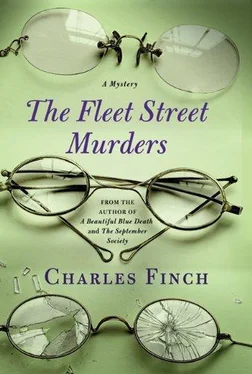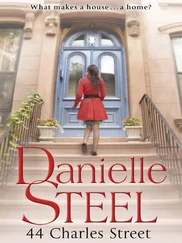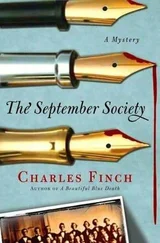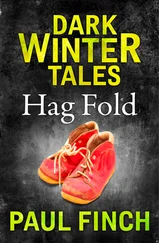Charles Finch - Fleet Street murders
Здесь есть возможность читать онлайн «Charles Finch - Fleet Street murders» весь текст электронной книги совершенно бесплатно (целиком полную версию без сокращений). В некоторых случаях можно слушать аудио, скачать через торрент в формате fb2 и присутствует краткое содержание. Жанр: Исторический детектив, на английском языке. Описание произведения, (предисловие) а так же отзывы посетителей доступны на портале библиотеки ЛибКат.
- Название:Fleet Street murders
- Автор:
- Жанр:
- Год:неизвестен
- ISBN:нет данных
- Рейтинг книги:5 / 5. Голосов: 1
-
Избранное:Добавить в избранное
- Отзывы:
-
Ваша оценка:
- 100
- 1
- 2
- 3
- 4
- 5
Fleet Street murders: краткое содержание, описание и аннотация
Предлагаем к чтению аннотацию, описание, краткое содержание или предисловие (зависит от того, что написал сам автор книги «Fleet Street murders»). Если вы не нашли необходимую информацию о книге — напишите в комментариях, мы постараемся отыскать её.
Fleet Street murders — читать онлайн бесплатно полную книгу (весь текст) целиком
Ниже представлен текст книги, разбитый по страницам. Система сохранения места последней прочитанной страницы, позволяет с удобством читать онлайн бесплатно книгу «Fleet Street murders», без необходимости каждый раз заново искать на чём Вы остановились. Поставьте закладку, и сможете в любой момент перейти на страницу, на которой закончили чтение.
Интервал:
Закладка:
After some minutes Lenox said, “You have a long and happy future ahead, Thomas.”
“Perhaps,” said the doctor.
“Will you sleep here tonight?”
“Thanks, Lenox, but no. I have to return. In case Toto needs me.”
“Of course-of course.”
McConnell stifled a sob. “To think I once called myself a doctor.”
“She had every attention a woman could,” Lenox gently reminded his friend.
“Except the one she needed, perhaps.”
“You mustn’t blame yourself. Truly.”
After several more drinks and a meandering, regretful conversation, McConnell left. Lenox promised to be in touch the next day and went to bed troubled in his mind.
At four in the morning, as Lenox slept, there was an urgent knock on his bedroom door. It was Graham, carrying a candle, bleary eyed.
“Yes?” said Lenox, sitting up instantly flooded with anxiety about Jane, about his brother, about the future. A nervous day had made for nervous rest.
“A visitor, sir. Urgent, I believe.”
“Who is it? McConnell?”
“Mr. Hilary, sir.”
“James Hilary?”
“Yes, sir.”
Hilary was the MP and political strategist Edmund had recommended Charles speak with. What on earth could he want?
Lenox made his way downstairs as quickly as he could. Hilary was sitting on the sofa in Lenox’s study. He was a handsome man, with nobility written on his brow; he had a pleasant and open face usually but at the moment appeared profoundly agitated.
“Goodness, man, look at the hour,” said Lenox. “What can it be?”
“Lenox, there you are. Come, you must tell your butler to pack a bag. Some sandwiches would be welcome for the trip, too. Even a cup of coffee.”
“What trip, Hilary?”
“Of course-where is my head? We’ve received a telegram; we need to go to Stirrington now.”
“Why?”
“Stoke is dead.”
“No!” cried Lenox.
Stoke was the Member of Parliament for Stirrington, whose retirement was going to prompt the election Lenox would compete in. He was a rural-minded, rough-mannered old man from an ancient family, who loved nothing but to run after the hounds and confer with his gamekeeper and for whom retirement held only happy prospects. He had never been meant for Parliament, but he had served his time honorably.
“Yes,” said Hilary impatiently. “He’s dead. His heart went out.”
“That’s awful.”
“Yes, and in two weeks Stirrington votes.”
“Two weeks?” said Lenox blankly. “You mean nine weeks. I have pressing matters to attend to here-”
“Two weeks will decide the by-election, Lenox. Come, we must fly.”
CHAPTER FIVE
Stirrington, which lay at the heart of the constituency Lenox hoped to represent, was a modest town of fifteen thousand souls, large enough to have several doctors, two schools, and a dozen pubs but small enough that cattle and sheep were still driven down the long High Street and everyone knew everyone else. To residents there the phrase “the City” referred not to London but to Durham, with its beautiful riverside cathedral, and as Hilary explained on their ride north, one thing Lenox must be sure not to do was speak down to them, or come off as oversophisticated, or glib, or slick.
“I’ll be myself, of course.”
“Of course,” said Hilary. Then he laughed. “Yet politics often requires certain attitudes. To adopt them one needn’t abandon one’s character.”
“Yes,” said Lenox uncertainly.
The trip there took hours upon hours. Durham County was nearly as far north as one could travel without reaching Scotland. The train arrived outside of town well after noon had struck, and both Lenox and Hilary-who had otherwise passed pleasant hours in doing what they loved, talking about the nature and strategy of politics-were famished. A small voice asked Lenox, too, whether he was now definitely beyond the distance at which he might have kept track of the two murders, and of course the great bulk of his thoughts were taken up with Thomas and Toto.
“To be honest, I wouldn’t accompany every candidate this far,” said Hilary. “But we’re friends, and perhaps more importantly, the balance is very fine in the House right now.”
“It is,” agreed Lenox. “I’ve followed the numbers on each side closely.”
“Every vote will see us closer to accomplishing our goals.” As two lads loaded luggage onto a carriage, Hilary stopped. “In other words,” he went on, “we need you to do your level best here.”
“To be sure,” Lenox responded and nodded with what he hoped was appropriate comprehension and solemnity.
Of course, what all this meant was that they wanted Lenox to spend money. The vast majority of parliamentary campaigns were self-funded or else funded by powerful local interests. Lenox was happy to lay out his own money, as his father and brother had. Still, Hilary’s message was, even if friendly in delivery, clear in intent. As Lenox already knew, their Conservative opponent, a brewer named Robert Roodle, was quite willing to lay out money on votes. Still, Lenox felt confident that the bank drafts in his pocket would be sufficient to argue his case (for broader civil rights and a firm but reasonable international policy) to the people of Stirrington.
That morning had been a busy one. First Lenox had dressed, as the harried servants packed; then the budding politician had written a brief but loving note to Lady Jane next door, begging her tolerance for his hasty departure, and a similar, more somber note to McConnell, promising his swift return and sending his dearest wish that Toto would recover quickly. Graham, it was decided, would follow on the evening train. Then a dash through dawn to the train station, followed by long hours of travel and conversation. Lenox was ready for lunch and a moment to breathe, in whatever order he could get them. Alas, the first was makeshift, and the second they skipped.
Their first destination was a pub, the Queen’s Arms, which dated to Queen Anne’s reign. They were going there to meet Lenox’s political agent, his chief local strategist and the man whom Lenox and Hilary hoped would deliver a large block of business voters, Mr. Edward Crook. It wasn’t a promising name.
“He’s the proprietor of the place,” said Hilary as they drove through the town. “Apparently from a long-standing Stirrington family, much respected here.”
Lenox was observing what he could: maids stringing up laundry, a small but fair church, a slightly more bitter cold than London. “Any family?”
Hilary consulted his notes. “Wife, deceased. No children. Crook’s niece lives with him and keeps his house, a girl named Nettie.”
“What’s Crook’s political history?”
“He helped Stoke win-but as you know that was no great achievement. The Stoke name means a good deal in this area, and Stoke has run largely unopposed since he first came into office. Before either of our times, of course. Undistinguished but loyal.”
“So Crook hasn’t much experience?”
Hilary frowned. “I suppose not much, but we have firm knowledge of his stature within the community. Apparently there’s a consortium of shop and tavern owners who listen to his every word. Shop owners, Lenox, win elections of this rural sort.”
“Yes?”
Hilary laughed. “By God, you’re lucky to run in such a place. My seat”-he represented part of Liverpool-“took a good deal more money and a great deal more maneuvering than this one will.”
Soon they pulled up to the Queen’s Arms. It was a distinguished-looking public house, with whitewashed walls that had black beams running across them, giving it a rather Tudor feel. An ornately painted, and really rather beautiful, sign depicted Anne with a crown and a detailed image of the world beneath her foot. There were stables to the rear of the house, rooms upstairs, and, from what they saw through the windows, a spacious one-room bar below.
Читать дальшеИнтервал:
Закладка:
Похожие книги на «Fleet Street murders»
Представляем Вашему вниманию похожие книги на «Fleet Street murders» списком для выбора. Мы отобрали схожую по названию и смыслу литературу в надежде предоставить читателям больше вариантов отыскать новые, интересные, ещё непрочитанные произведения.
Обсуждение, отзывы о книге «Fleet Street murders» и просто собственные мнения читателей. Оставьте ваши комментарии, напишите, что Вы думаете о произведении, его смысле или главных героях. Укажите что конкретно понравилось, а что нет, и почему Вы так считаете.












